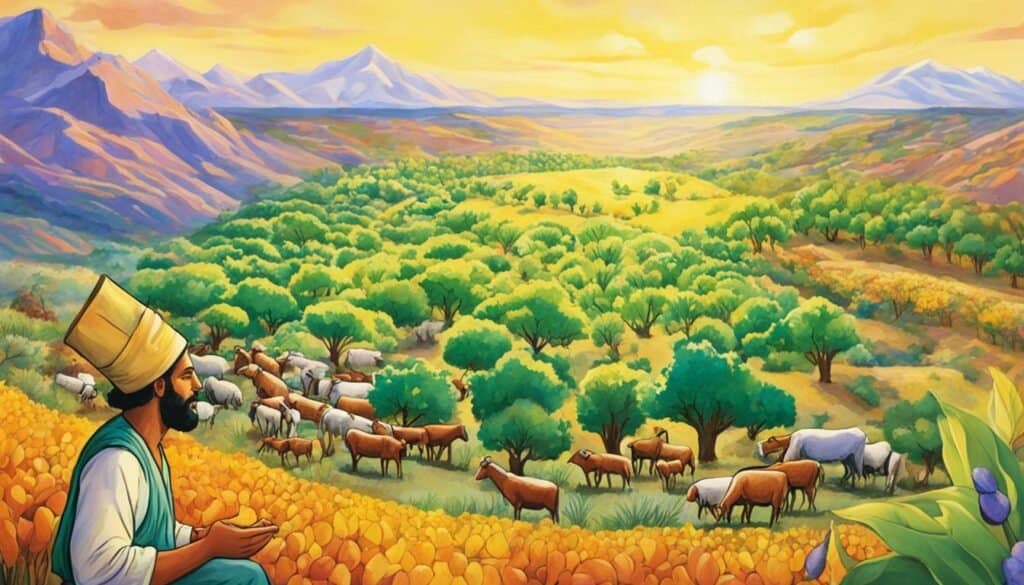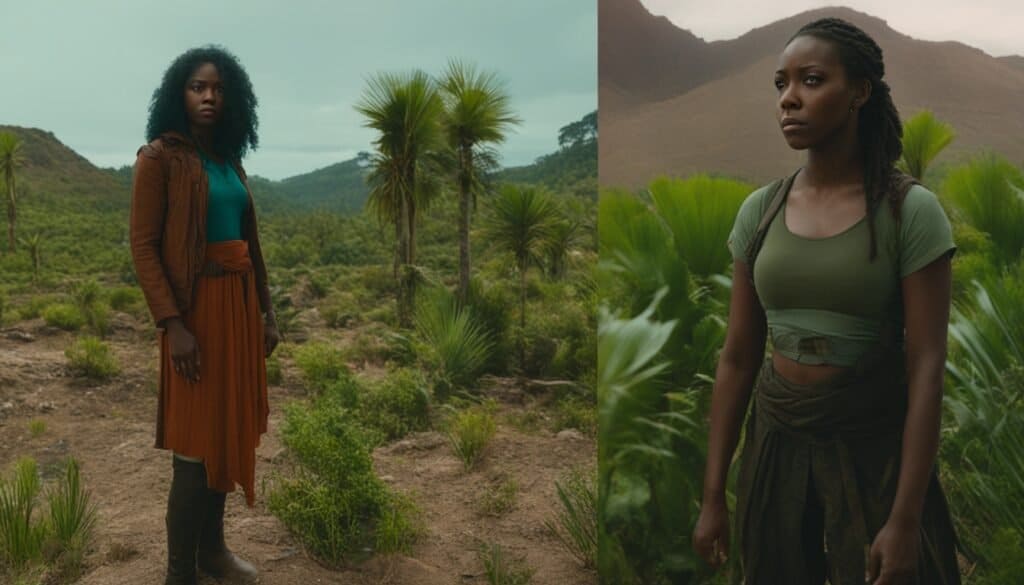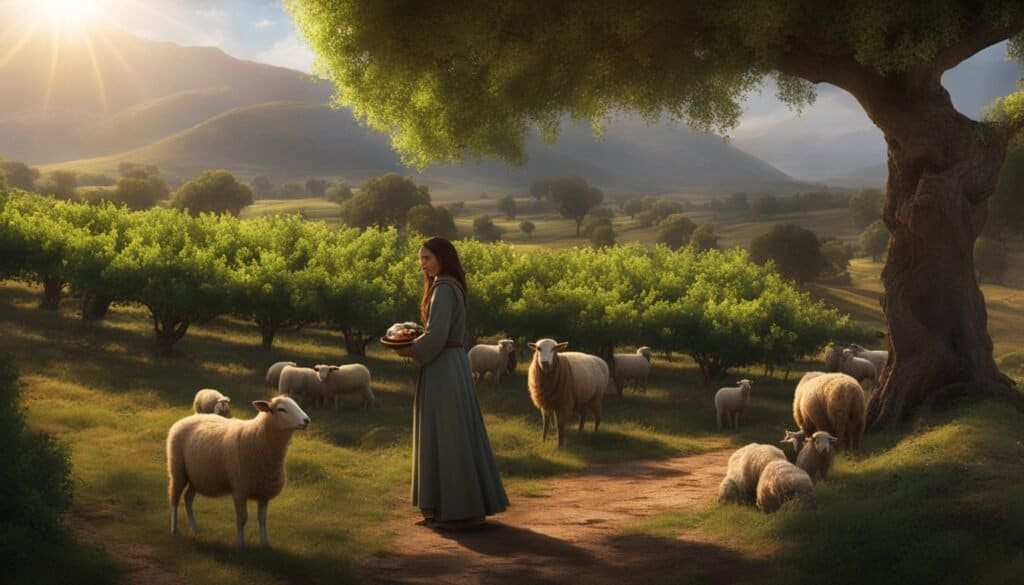Have we ever thought about why Keturah, Abraham’s other wife, is so important in the Bible? Her story starts in Genesis 25:1, where we find out, “Then again Abraham took a wife, and her name was Keturah.” This verse shows Abraham’s family line continuing and makes us think about family ties in the Bible’s early stories. But do we really get how Keturah helps shape our view of the Abrahamic tradition?
Key Takeaways
- Keturah is referred to as Abraham’s other wife in Genesis.
- Genesis 25:1 introduces Keturah as a significant figure in Abraham’s lineage.
- Her children contribute further to the concept of lineage in biblical history.
- Keturah’s story provides insights into the dynamics of Abraham’s family.
- Understanding Keturah can shift our perspectives on the biblical narrative.
Introduction to Keturah
Let’s explore the story of Keturah, a woman whose impact on biblical history is often overlooked. By looking at Keturah in Genesis, we see her as more than just Abraham’s wife. Her marriage to Abraham marks a key event in the biblical story, expanding Abraham’s family line.
The story of Keturah in Genesis
Keturah becomes a key figure after Sarah’s death. After losing his first wife, Abraham marries Keturah, starting a new chapter in his life. They had many children together, enriching Abraham’s family and creating various tribes.
Her sons, like the Midianites, are important in the story of the Israelites.
Significance of Keturah in the biblical narrative
Keturah is more than just a wife. She ensures Abraham’s legacy lives on through her children, who formed different communities. This shows Abraham’s lasting impact on history.
Her story highlights the vital role of women in ancient times. They had a big influence on future generations, even if it’s not always recognized. For more on Keturah’s role, check out this insightful discussion.
Keturah’s Children
Keturah’s legacy shines through her children, who made their mark in history. They came from her marriage to Abraham and formed diverse tribes. Each child played a part in the biblical story and influenced the cultures around them.
The names and tribes of Keturah’s offspring
Keturah had six sons: Zimran, Jokshan, Medan, Midian, Ishbak, and Shuah. These sons became leaders of their own tribes. They carried on a rich legacy that is still seen today. Here is a table with their names and the tribes they led:
| Name | Tribe/Nation | Significance |
|---|---|---|
| Zimran | Zimranites | Known for their connections to ancient trade routes. |
| Jokshan | Jokshanites | Associated with various Arabian tribes. |
| Medan | Medanites | Contributed to the cultural exchanges in the region. |
| Midian | Midianites | Interacted significantly with Moses and the Israelites. |
| Ishbak | Ishbakites | Played roles in the expansion of trade and agriculture. |
| Shuah | Shuahites | Involved in various ancient alliances and conflicts. |
Impact of Keturah’s children on history
The tribes of Keturah’s children left a big mark on biblical history. The Midianites, for example, had important interactions with Moses. They helped shape the complex world of ancient cultures and alliances in the Bible.

The Significance of Midian
The Midianites, who came from Keturah’s son Midian, are very important in the Bible. They affect big events in Israel’s history. They are not just a family line but also connect with important people and shape tribe relationships.
Role of the Midianites in biblical events
The Midianites show up at key times in the Bible. They work with different groups, changing events with their location and resources. Being traders, they help move goods across lands, playing a big part in the Exodus. Their interactions with the Israelites show how complex social ties were in the old days.
Interactions with Moses and the Israelites
Moses had big dealings with the Midianites, especially when he went to Midian after leaving Egypt. He found safety with them and married Zipporah, a Midianite. This link brought diplomacy and help as Moses led the Israelites out of slavery. These interactions show important parts of both cultures, helping to bridge gaps between allies and rivals.
Abraham’s Legacy and Provision
Abraham’s legacy is about his deep family ties. He managed the inheritance and blessings for his children with care. He showed a balanced approach to his sons Isaac and the children of Keturah. This balance is key to understanding his role in his family and his faith.
Understanding Abraham’s relationship with Isaac and Keturah’s children
In Genesis, Abraham was very generous to Keturah’s children. Yet, he made sure Isaac’s inheritance was safe. This is shown in Genesis 25:6, where it says, “But unto the sons of the concubines, which Abraham had, Abraham gave gifts, and sent them away from Isaac his son.”
This shows Abraham cared for Keturah’s children but kept Isaac’s inheritance safe. This decision was crucial for the covenant promise. It shows God’s plan for many nations to come from Abraham’s family.
Abraham’s actions show how family and faith work together to shape the future. He balanced giving to Keturah’s children and keeping Isaac’s inheritance. This teaches us that family duties connect across generations, even if relationships vary.

Keturah in the Bible: A Contrast to Sarah
Keturah’s story in the Bible is interesting when compared to Sarah’s. While Sarah is known for carrying the covenant promise, Keturah has her own special place in Abraham’s family. Their stories show two different paths from Abraham, each important in its own way.
Sarah’s role in the covenant promise
In Genesis 17:19, God makes a powerful promise to Sarah. He tells her she will have a son named Isaac. This promise makes Sarah very important in the covenant. The covenant promises blessings to Isaac and his family, showing them as the key to God’s plans.
Keturah’s descendants and their blessings
Keturah’s children were blessed by God too, even though they weren’t part of the main covenant promise. They added to the story of Abraham’s descendants in their own way. Keturah’s line is often overlooked but is full of blessings that didn’t come through Isaac.
Each of Keturah’s children played a part in history, showing God’s grace to all of Abraham’s descendants.

Here’s a table to show the main differences between Keturah and Sarah:
| Aspect | Sarah | Keturah |
|---|---|---|
| Role | Bearer of the covenant promise | Mother of additional tribes |
| Children | Isaac | Midian, Zimran, Jokshan, Medan, Ishbak, Shuah |
| Divine Promise | Central to God’s covenant | Blessings, but not part of covenant line |
Looking at Keturah and Sarah helps us see the full picture of Abraham’s legacy. Each woman’s family is important and shows how God’s promises can be fulfilled in different ways.
Keturah’s blessings are part of her story, showing how all of Abraham’s descendants are connected. They remind us of God’s wide reach and how He works with people in many ways. For more on the meanings behind these names in Genesis, check out the symbolic meanings behind the names.
Keturah and the Covenant
Keturah and the covenant show us a special part of God’s plan for us. Isaac is known as the child of promise. But Keturah’s story adds a new chapter to the Bible, making the story richer.
God’s promise regarding Isaac
God made it clear in Genesis 21:12 that Isaac was the child of promise. This shows Isaac’s special role in God’s covenant with Abraham. Isaac is key to the story of faith and redemption.
The promise to Abraham was through Isaac. This means Isaac’s family line is important for God’s plan.
Keturah’s place outside the main covenant
Keturah’s story shows us that her family is important, but they are not part of the main covenant. They add to the story but don’t get the same promises as Isaac’s family. This tells us God’s plan is big and includes many families and nations.

Role of Keturah in Biblical Genealogy
Keturah is a key figure in biblical genealogy. Her family line adds a lot to the story of Abraham’s family. The book of 1 Chronicles tells us about her role and how she helped shape the future of a famous biblical figure.
Genealogical references in 1 Chronicles
In 1 Chronicles 1:32, Keturah is mentioned directly. This shows she was not just Abraham’s wife but also the mother of many tribes. Her children were important and had a big impact on the area.
Looking into these references helps us see why genealogy is important in the Bible. It’s not just about who came from whom. It’s also about how God kept his promises over time. Keturah’s family tree shows how God’s plan unfolded through generations.
For more details on these family ties, check out this source. Each name and family line tells us about God’s plan in history. It shows how every person played a part in the stories that came after.
| Child of Keturah | Significance in the Bible | Associated Tribe/Nation |
|---|---|---|
| Zimran | Described as a leader | Midian |
| Jokshan | Father of Sheba and Dedan | Sheba |
| Medan | Less documented but part of the lineage | Unknown |
| Midian | Established multiple clans | Midianites |
| Ishbak | Less focused in biblical accounts | Unknown |
| Shuah | Noted for descendant tribes | Unknown |
This table shows us the importance of Keturah’s children. It tells us about their roles in biblical history. The stories in 1 Chronicles and our understanding of Keturah’s family help us see the big picture.
Theological Implications of Abraham’s Marriages
Abraham’s marriages give us deep insights into his family’s spiritual meaning. They show us how his family ties connect to big themes in the Bible. This is especially true when we look at Paul’s view in Galatians.
Paul’s interpretation of Abraham’s family in Galatians
In Galatians 4:22-23, Paul uses a strong analogy. He talks about Abraham’s sons, Isaac and Ishmael, to explain the two covenants. This helps us see Abraham’s marriages as symbols of big spiritual stories.
Isaac, born to Sarah, stands for the Old Covenant and the law. On the other hand, Ishmael, from Hagar, represents the New Covenant and grace.
Old Covenant vs. New Covenant representation
Paul’s words help us grasp the deep spiritual meanings of Abraham’s marriages. The Old Covenant is about following the law. The New Covenant is about faith and grace.
Keturah’s family adds more to this idea, showing God’s plan includes everyone. This shows God calls people in many ways, not just through blood ties. It’s about a big, inclusive family of faith.
Cultural Impact of Keturah’s Descendants
Keturah’s descendants, especially the Midianites, left a big mark on the Bible’s story. They played a big role in Israel’s history, affecting their interactions and conflicts. They were often seen as rivals in battles in the Bible. This shows the complex relationships Israel had with other nations and tribes.
Significance of the Midianites in Israel’s history
The Midianites were a strong force in key times in the Bible. They are well-known in the story of Gideon, where they were a main enemy. Judges 6 shows how they were part of Israel’s identity and the cultural scene back then. Learning about the cultural impact of the Midianites helps us see their part in important events and God’s plan.
Their role in the battles faced by Israel
The Midianites often fought against the Israelites, making them key players in battles in the Bible. Each fight showed their military skills and the deep tensions between them. These battles highlight the changing nature of ancient relationships and the Israelites’ strength in facing challenges. We can learn more about these big events through discussions on earth-shattering disasters and judgments in the Bible.
The Midianites’ legacy still affects our view of Israel’s growth. Their story shows why looking at Midianites influence in the Bible is key to understanding the ancient world.
| Key Events | Description | Significance |
|---|---|---|
| The Midianite Oppression | Israelites faced years of oppression from Midianites (Judges 6) | Highlighted Israel’s struggles and need for deliverance |
| Gideon’s Fleece | Gideon sought confirmation from God before battle (Judges 6:36-40) | Demonstrated the importance of faith and divine guidance |
| Victory Over Midianites | Gideon’s army triumphed using unconventional tactics (Judges 7) | Showcased the power of God in overcoming larger forces |
What Are the Lessons Learned from Keturah’s Story in Relation to the Rebellion of Korah?
Keturah’s story reflects resilience and faithfulness, offering vital insights into community dynamics. By examining her journey alongside understanding the korah rebellion in scripture, we learn the importance of humility and obedience to divine authority. This connection fosters deeper appreciation for the balance between personal aspirations and collective harmony.
Lessons from Keturah’s Story
Keturah’s story in the Bible teaches us about God’s plans. It shows us that every person is important in God’s story. Even though she’s not as famous as Sarah, her role is key. It tells us that everyone has a special place in God’s kingdom.
Looking at Keturah’s life, we learn from Romans 8:28. This verse says that “all things work together for good to them that love God.” It teaches us to have faith and trust in God, no matter what. Keturah’s story shows us that God’s plans are bigger than we can imagine. Even the Midianites, her descendants, play a part in God’s story.
We can learn a lot from Keturah’s story. It teaches us to see our value in God’s plan, whether we’re in the spotlight or not. Every life adds to the rich story of existence. By understanding our role, we can make the most of our unique contributions to God’s plan. For more on courage in faith, check out this link: acts of courage.
Affiliate Disclosure: "As an Amazon Associate I earn from qualifying purchases made from links in this post. We are a participant in the Amazon Services LLC Associates Program, an affiliate advertising program designed to provide a means for us to earn fees by linking to Amazon.com."

